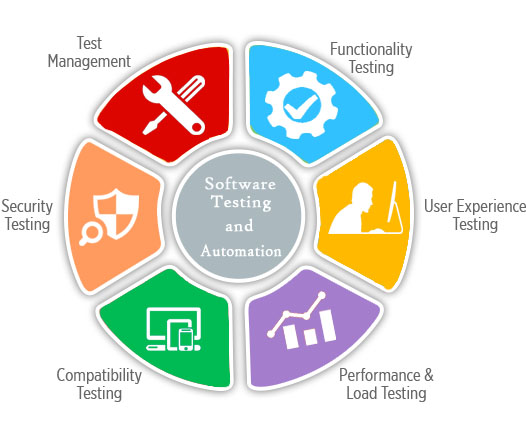Manual Testing
- Fundamentals of Testing
- Types of testing tools
- Verification & Validation
- Test Planning
- Test Designing
- Defect Reporting
Testing Tools
- Test Management Tool
- Defect Management Tool
- Functional Testing Tool
- Performance Testing Tool
Automation Testing (Selenium)
- Selenium IDE
- Selenium WebDriver POM (Selenium 3)
- Frameworks (Data,Keyword & Hybrid Driven)
- Selenium Grid
- JDBC
ISTQB Foundation Level Preparation
ISTQB Agile Level Preparation
Benefits of Learning Software Testing
- Easiest Option to get Job in to IT Industry
- Common fundamental to test all the types of application
- Less knowledge of Programming required
- Endless future scope and Growth
- Easy to learn for Non IT & IT Candidates also.
- Equal opportunities & growth as compare to Software Development.
- Learn and be an International Certified Software Tester.
- Creative, Technical & Interesting.
- Software Testing constantly gives opportunities to grow in career to reach a Managerial Level.

Manual Testing Modules
Introduction to Testing:-
Objectives of Testing, Types of Defects, SDLC (Software Development Life Cycle) Requirement Gathering & Analysis, Planning, Design, Test Methods, Black Box Testing, White Box Testing, STLC (Software Testing Life Cycle), Test Planning & Control, Test Analysis and Design, Test Implementation and Execution, Exit Criteria and Reporting, Principals of Testing.
Development Models:-
Sequential Model, Incremental Model, Waterfall Model, Agile, RAD (Rapid Application Development), Spiral Model.
Verification and Validation:-
Verification, Walkthrough, Inspection, Validation, Levels of Testing, Component Testing, Integration Testing, Drivers, Stubs, System Testing, User Acceptance Testing, Alpha Testing, Beta Testing, V Model
Test Methods and Test Types:-
Retesting, Regression Testing, Security Testing, Smoke Testing, Sanity Testing, Functional Testing, Non Functional Testing, Performance Testing, Load Testing, Compatibility Testing, Configuration Testing, Usability Testing, User Interface Testing
Requirement Analysis & Use Case:-
Use Case, Requirement Analysis
Test Plan and Strategy:-
Test Plan – Introduction, Test Plan Attributes, Approach/Strategy, Suspend/Resume Criteria, Entry & Exit Criteria, Configuration Management
Test Design Techniques:-
Techniques of Test Design, Equivalence Class Partition, Boundary Value Analysis, Test Case Template
Defect Management:-
Types of Defects, Status of Defect, Defect Reporting Template, Severity, Priority
Manual and Automation testing:-
Manual Vs Automation, Advantage & Disadvantage, Introduction of Automation Fundamental test process, Different methods of testing, Different types of testing, Requirement analysis Test planning, Test design, Defect tracking and reporting, Web testing, Mobile testing, Security testing (Fundamental test process, Different method of testing, Different types of testing, Requirement analysis). Test planning, Test design, Defect tracking and reporting, Web testing, Mobile testing, Security testing)
Automation Testing Tools (Content)
Functional Testing tool, Performance Testing tool, Defect Reporting tool, Test management Tool.
(Includes installation of tools, Writing scripts, Execution of scripts, framework’s, project implementation).
